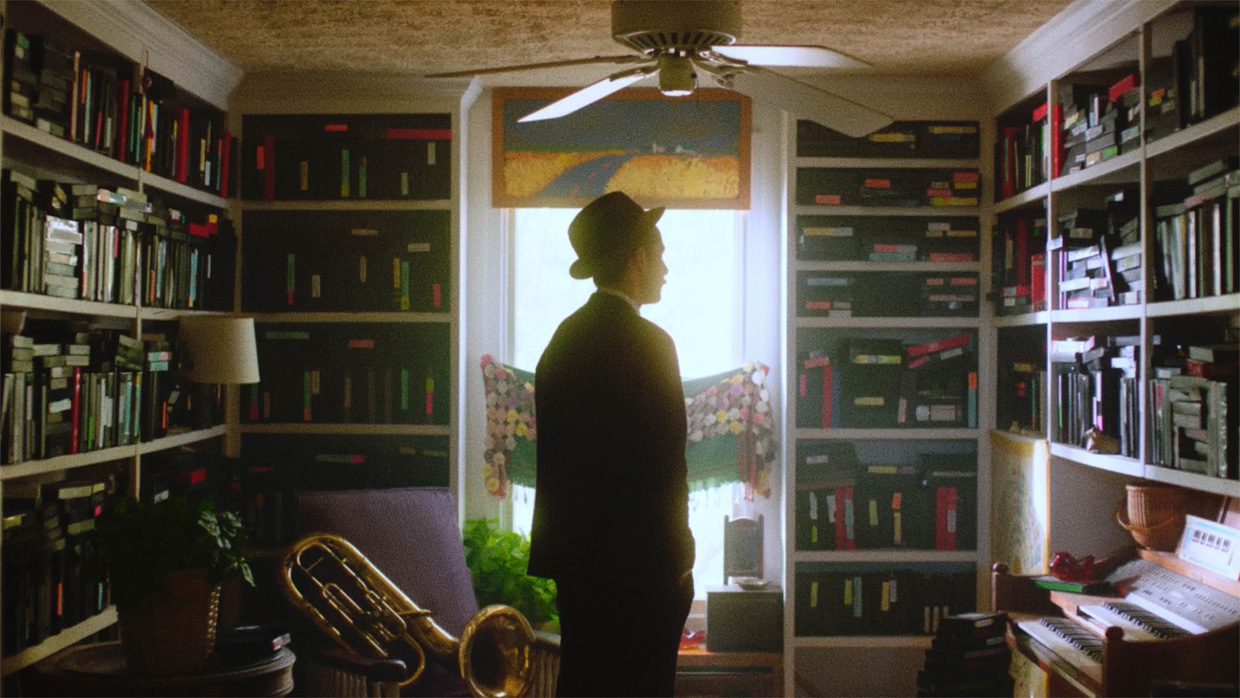 Back to selection
Back to selection
“Eye-Opening How Much We Could Achieve in This Process”: Editors Kentucker Audley and Albert Birney on Strawberry Mansion
 Strawberry Mansion
Strawberry Mansion Kentucker Audley and Albert Birney’s surreal sci-fi romantic comedy Strawberry Mansion reimagines the dystopia as something shockingly similar to our own world: a society where even our dreams are plagued with marketing and advertisement. The director duo also acted as editors for the film, and share the joy of working with post-VFX for the first time.
Filmmaker: How and why did you wind up being the editor of your film? What were the factors and attributes that led to your being hired for this job?
Birney: We’ve always edited our own work—it just seems like a natural part of our process.
Audley: When I first learned to edit, I remember realizing that this was actually where it happens, when the film is actually being made. In production, you’re just accumulating the pieces, but editing is where the wheels hit the road. Long story short: we both love editing and it saves us money because we don’t have to pay an outside editor.
Filmmaker: In terms of advancing your film from its earliest assembly to your final cut, what were goals as an editor? What elements of the film did you want to enhance, or preserve, or tease out or totally reshape?
Audley: Personally, my main goal was to keep things moving. It takes a while for our story to kick into gear, so I knew we had to keep the pace up in the setup. In the end, this turned out to be somewhat wrong. Some of the early feedback we received was people wanting to know more about our characters, and they weren’t so worried about a slower pace. So the more we built our characters and the world, the more situated they were when things got crazier.
Filmmaker: How did you achieve these goals? What types of editing techniques, or processes, or feedback screenings allowed this work to occur?
Birney & Audley: Oftentimes, it just meant seeing more of a particular scene, or letting the scene linger, giving people the space to soak in the world. We leave many questions unanswered, so initially we were worried this would frustrate people, but most of our test audiences seemed willing to go with it, and we became more confident in taking our time.
Filmmaker: As an editor, how did you come up in the business, and what influences have affected your work?
Audley: I don’t consider myself an editor necessarily. It just always felt like a part of being a filmmaker. I don’t think about editing in terms of watching other films or having favorite editors or editor influences. I can’t separate it from the film in general.
Filmmaker: What editing system did you use, and why?
Birney & Audley: We edit on Premiere. We both learned on Final Cut Pro, but we never made the transition to Final Cut Pro X. And so Premiere seemed like an easy transition.
Filmmaker: What was the most difficult scene to cut and why? And how did you do it?
Birney & Audley: Other than finding the right pace and tone of the opening set-up, the hardest sequence was a thread that we ended up cutting out of the film completely. We struggled for months on this sequence, which was scripted to be 10-15 minutes of the film. It’s hard to describe without seeing the film, but it involved two side characters who came back and played a larger part. It was interesting visually and really strange and unsettling, but it felt like it moved away from the emotional core of our story, so eventually we had to cut it altogether.
Audley: In general, the biggest challenge I thought was trying to find a balance between the emotional through line, and the anything-goes dream logic.
Filmmaker: What role did VFX work, or compositing, or other post-production techniques play in terms of the final edit?
Audley: This was the first time Albert or I have dealt with post-VFX, and it was anxiety-producing to not know exactly how something was going to look until the very end. But we trusted our collaborators, and in the end, it was eye-opening how much we could achieve in this process. Going forward, I think we’re going to implant way more VFX in future work, while trying to maintain that tactile, homemade quality that we love.
Filmmaker: Finally, now that the process is over, what new meanings has the film taken on for you? What did you discover in the footage that you might not have seen initially, and how does your final understanding of the film differ from the under-standing that you began with?
Audley: I think it’s too early to tell. Basically, we’re just so sick of seeing this movie—we’ve watched it hundreds of times. It may be 10 years before I can watch it again. So I’ll have to see what new meanings it takes on at that point. Will report back!
